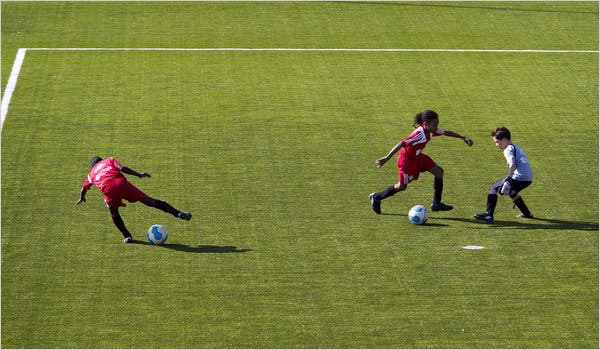As someone who plays soccer regularly with my childhood school friends, one thing about my style stands out—I prefer passing over dribbling. It’s not because I lack the confidence to take on defenders or don’t enjoy flashy footwork. It’s because, over the years, I’ve come to admire and appreciate the simplicity, elegance, and effectiveness of passing. To me, a well-timed, accurate pass is one of the most beautiful acts in soccer.
I’m a striker, but not the kind who always looks to beat three defenders and score solo goals. Instead, I’ve built my game around movement, positioning, and—most importantly—passing. I’ve learned that a quick pass can unlock defenses in ways that solo dribbling sometimes cannot. Let me take you through my journey, my playing style, and why I believe passing is such a vital part of not just soccer, but life itself.
Read also: My Evolution as a Left-Footed Striker
The Beauty of the Pass
Whenever I receive the ball on the field, my instinct is to look up and scan for passing options. I love the idea of moving the ball quickly, catching defenders off guard, and creating space for my teammates. A clever pass can dismantle an organized defense faster than any dribbling run. It’s like a spark that ignites an entire attacking sequence.
There’s something incredibly satisfying about executing a give-and-go, watching your teammate receive the ball, and then seeing it come back to you in stride. It’s not just about the assist or the goal that might follow—it’s the harmony and rhythm, the teamwork, the shared understanding. That’s what draws me to passing.
My Bond with Ansar: A Passing Masterclass
Among my regular Friday soccer group, Ansar is one player whose passing skills I deeply admire. He has an instinct for it—the weight of the ball, the angle, the timing. When I play with Ansar, we often don’t need to speak. A simple look or movement is enough to trigger a pass.
Our passing combinations have evolved into a kind of dance. There are moments when the ball moves between us so smoothly that we leave defenders frozen. We play one-touch soccer, sliding the ball into space, trusting each other completely. It’s one of the most rewarding aspects of our matches, and I think it shows how strong chemistry and understanding can outperform even the most technical dribblers.
Mesbah, Ansar, and Wahid: Building Chemistry
It’s not just with Ansar. Our entire squad has started appreciating the value of passing. Wahid and Ansar have also built a great rhythm between them. I’ve watched them string together five or six quick passes that cut through the opposition like a hot knife through butter. It’s beautiful to watch, and even more fulfilling to be a part of.
This chemistry didn’t develop overnight. It came from years of playing together, making mistakes, learning each other’s strengths, and trusting one another. Passing isn’t just about the ball—it’s about connection. It requires awareness, trust, and selflessness.
Teaching My Kids the Joy of Passing
I often take my son, Munasir, to the field with me. I want him to love football, not just as a game, but as a tool for learning life skills. One of the first things I teach him is the importance of passing.
When he runs with the ball, I gently remind him, “Look up, find your teammate.” I want him to see that football isn’t about individual glory. It’s about collaboration, awareness, and timing. When he pulls off a clean pass and his teammate scores, I can see the joy on his face—and I know he’s learning more than just football.
Passing teaches humility. It teaches that you don’t always need to be in the spotlight to make an impact. Sometimes, your role is to set others up for success. That’s a powerful lesson, both on and off the pitch.
Why I Don’t Dribble Much
It’s not that I can’t dribble. I’ve practiced it, and sometimes I’ll take on a defender if the space is open. But for the most part, I find dribbling to be high-risk, especially in tight matches. A mistimed dribble can cost us possession and momentum. A pass, however, can keep the flow going, maintain control, and bring everyone into the game.
Dribbling can be thrilling to watch, but passing brings more people into the story. It empowers teammates, creates shared victories, and builds collective confidence. That’s the kind of soccer I want to be part of.
The Power of Quick Decisions
In soccer, timing is everything. I’ve learned to make decisions quickly, often within a second of receiving the ball. That quick scan—who’s moving, who’s open, who’s calling—determines the next pass. It’s a mental game as much as a physical one.
Passing sharpens your awareness. It forces you to be present. You’re constantly thinking not just about where your teammates are, but where they’re going to be. That predictive thinking has helped me on the field and even in life. It trains your mind to anticipate, react, and support others proactively.
Building Respect Through Passing
In our team, respect is earned through contribution—not by being the most flashy, but by being reliable. When you pass well, when you help others play better, you earn that respect. I’ve seen this in how our younger players look up to the older ones who move the ball intelligently.
When a teammate trusts you to give the ball at the right time and in the right place, you’ve built something valuable. That’s the respect I strive for every Friday.
Memories Made Through Shared Play
Some of my favorite soccer memories aren’t goals I’ve scored but plays we’ve built together. I remember one match where Ansar and I exchanged four quick passes before he slotted the ball in the bottom corner. It was so seamless, even the opposing team clapped.
Moments like that stay with you. They become stories you share over snacks after the game. They’re the glue that keeps our team close, year after year. They remind us that soccer isn’t just about competition—it’s about connection.
Laughs, Arguments, and Growth
Of course, we’re not always perfect. Sometimes, we misplace a pass or get frustrated when a teammate doesn’t see a run. We argue, we laugh, we shout—but always with love. Those little fights actually strengthen our bond. They show that we care.
After the match, we cool down together, sip tea, and talk about the game. “Why didn’t you pass to me there?” someone will joke. “Next time, I promise,” I reply. These post-match hangouts are just as important as the game itself. They’re part of our routine, our therapy, our brotherhood.
Passing as a Life Philosophy
Beyond the game, passing has become a philosophy for me. In life, just like in soccer, you don’t always have to take everything on yourself. Sometimes, the best thing you can do is support someone else. Pass them the opportunity. Set them up for success.
In family life, at work, and in faith, I’ve seen how teamwork brings out the best in people. I’ve learned to look up, to notice who needs help, and to act quickly. That habit, born on the football pitch, has made me a better father, colleague, and friend.
Final Thoughts
Soccer has given me many things—fitness, joy, friendships—but passing has given me perspective. It’s taught me that playing well isn’t about how many goals I score but how well I involve others in the game.
Whether I’m passing to Ansar in a tight match, encouraging Wahid to trust the one-two, or teaching my son to look up and find his teammate, I’m living my values on the pitch. And every Friday, when I step onto that field with my brothers, I know I’m exactly where I’m meant to be—playing the beautiful game the way I love it: with heart, with humility, and with the perfect pass.






